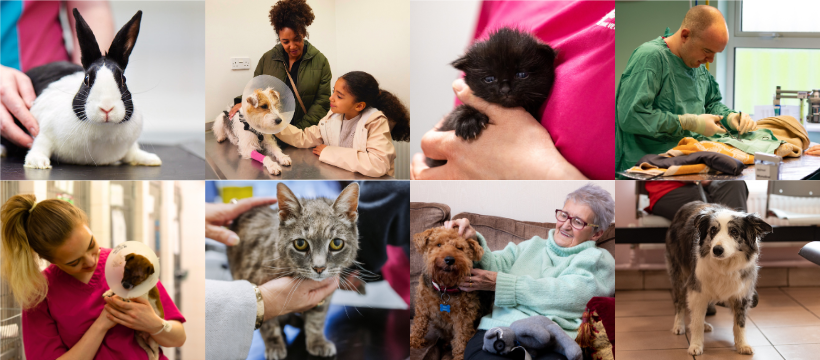
The People's Dispensary for Sick Animals (PDSA) is a British institution, a veterinary charity whose history, mission, and impact are deeply intertwined with the social fabric of the United Kingdom for over a century. Its story is one of compassionate innovation, unwavering dedication, and the profound bond between humans and animals. From a humble basement clinic in London to a nationwide network of state-of-the-art hospitals, the PDSA's journey is a testament to the vision of its founder, Maria Dickin, and the enduring need for its services.
To qualify for PDSA help you must be in receipt of benefits and live in the postcode catchment area of a PDSA Pet Hospital or Pet Care Scheme practice.
People's Dispensary for Sick Animals

The genesis of the PDSA lies in the compassion and determination of Maria Dickin. Born in 1870, Dickin was a social reformer and humanitarian who dedicated her life to helping those in need. During her social work in London's impoverished East End, she was struck by the sight of animals suffering from illness and injury because their owners, living in dire poverty, could not afford veterinary care. This suffering was an added burden to families who relied on their animals for companionship and, in some cases, livelihood. Dickin believed that "there should be no difference between the cry of a suffering animal and the cry of a suffering human." This powerful conviction drove her to action.
On November 17, 1917, despite widespread skepticism and opposition from the established veterinary community, she opened the first People's Dispensary for Sick Animals in a basement on London's Whitechapel Road. Her sign, a simple yet profound declaration, read: "Bring your sick animals! Do not let them suffer! All animals treated. All treatment free." The response was immediate and overwhelming. On the first day, four animals were treated, but word spread quickly, and soon people were queuing for hours. The immense demand proved that her service was not just a whim, but a vital necessity.
Within a decade, the PDSA had expanded dramatically. Maria Dickin designed and equipped the first horse-drawn mobile clinic, which was soon replaced by a fleet of motor caravans, bringing veterinary care directly to communities across the country. By the late 1920s, the charity was treating hundreds of thousands of animals annually and had opened clinics not only in the UK but also internationally in places like Paris, Tangier, and Greece, demonstrating the universal need for accessible animal care.
The PDSA's core mission today remains true to its founding principle: to provide free and low-cost veterinary services to the sick and injured pets of people who are homeless and those in financial hardship. The charity's ethos is built on the understanding that for many, a pet is a cherished family member, and the thought of being unable to afford life-saving care is devastating. The PDSA acts as a lifeline, preventing the heartbreak of an owner having to choose between their pet's health and their own financial stability.
Beyond direct treatment, the PDSA also plays a crucial role in preventative care and public education. They believe that a healthy pet population requires knowledgeable owners. Their work includes promoting responsible pet ownership, offering advice on nutrition, exercise, and preventative treatments, and highlighting common health issues through campaigns and resources like the annual PDSA Animal Wellbeing (PAW) Report, which provides a comprehensive overview of the nation's pet health.
The charity's work is funded entirely by public support, with no government funding. This makes its charity shops, fundraising events, and generous donations from the public absolutely critical to its operation.
The PDSA's physical presence is a cornerstone of its service. With 48 Pet Hospitals located across the UK, from Glasgow to Plymouth, they form a network of accessible care for eligible clients. These hospitals are fully equipped with modern surgical suites, diagnostic tools like X-ray and ultrasound machines, and dedicated teams of veterinary surgeons and nurses.
The range of services offered is extensive, covering everything from routine check-ups and vaccinations to complex surgeries and emergency care. The charity provides veterinary treatment for a wide variety of animals, including dogs, cats, rabbits, and other small pets. While the services are free, the PDSA encourages voluntary donations to help cover the costs of treatment, which can be significant. The eligibility for free care is based on the owner's receipt of certain means-tested benefits and living within a specified catchment area of a PDSA Pet Hospital.
The charity also operates a number of fundraising campaigns to support specific aspects of its work, such as providing life-saving equipment, covering the cost of urgent surgery, or funding the work of individual hospitals.
A unique and celebrated aspect of the PDSA's work is its Animal Awards Programme, which raises the status of animals by honouring their extraordinary acts of bravery and devotion.
The most famous of these is the PDSA Dickin Medal, established by Maria Dickin in 1943. Widely considered the "animals' Victoria Cross," the medal recognizes outstanding gallantry or devotion to duty by animals serving in military conflict or civil defence. The list of recipients reads like a roll call of animal heroism, from messenger pigeons like 'G.I. Joe' who saved over a hundred Allied soldiers from a bombing raid, to dogs like 'Beauty' who rescued 63 animals from bomb-damaged buildings during the Blitz, and cats like 'Simon' who defended his crew from a rat infestation during a 101-day siege on a British warship. The Dickin Medal highlights the vital, often unseen, role that animals have played throughout history.
In 2014, the PDSA established the PDSA Order of Merit, the animal equivalent of the British Empire's Order of the British Empire (OBE). This award recognizes animal devotion to their owners or to society, honouring those who have displayed extraordinary courage or loyalty outside the context of military action, such as service animals and police dogs.
In recent years, the PDSA has continued to adapt its services to meet the changing needs of the public. They have launched campaigns to address the ongoing cost-of-living crisis, which has put immense pressure on pet owners and increased the demand for their services. Their news stories frequently feature heartwarming accounts of animals whose lives were saved thanks to the generosity of donors and the expertise of their veterinary teams.
Events are a crucial part of the PDSA's fundraising strategy. They participate in major national events like the London Marathon, encouraging runners to join "#TeamPDSA" and raise vital funds. They also hold local events, from community bake sales to dog shows, all designed to engage the public and raise awareness of their mission. For those who can't attend, the PDSA's website and social media channels are regularly updated with stories, advice, and opportunities to get involved, from volunteering to making a one-off or monthly donation.
The PDSA’s enduring legacy is its steadfast commitment to the principle that an animal's life should never be devalued by its owner's financial situation. It continues to be a powerful and compassionate force in the world of animal welfare, a testament to Maria Dickin's vision and the countless people and animals it has helped over the last century.